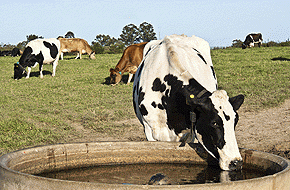
By Willy Leferink*

I am writing this from Vietnam as I look at how they farm. For a communist country it seems pretty entrepreneurial but that’s come out of reality versus theory.
After reunification, in 1976, the purists collectivised rice production and collapsed output.
One decade later, Vietnam allowed its farmers to grow and sell their own rice, albeit, within boundaries.
Today however, Vietnam has become the World’s No. 1 rice exporter.
When it comes to rice production water is critical as it is back in New Zealand.
In our many discussions about water quality we often overlook the fact that livestock need good quality drinking water too. Cows are mammals just like humans so good water is in farming’s own self-interest.
Given the marvels of modern communication, I managed to catch One News’ coverage of the proposed amendments to the National Policy Statement for Freshwater Management.
It may sound dry but it has massive implications for all Kiwis.
There was Environment Minister Amy Adams and ‘for balance’ the reporter went to Massey’s Dr Mike Joy. Sure as night follows day, he pooh-poohed the entire thing and wasn’t shy at fingering ‘intensive’ agriculture.
Given this framework was assembled by 60 of New Zealand’s foremost freshwater scientists, I got the distinct impression he wasn’t one of them.
At least one council manager has put finger to keyboard and made an outstanding contribution to the muddy issue of water quality over at www.sciblogs.co.nz.
Written by Taranaki Regional Council’s Gary Bedford and called “Bugs in the system,” it kicks off like this:
When it comes to recreational use of freshwater, are we swimming in mixed messages? Fairfax reported that‘More than 60 per cent of monitored rivers in New Zealand are unsafe for swimming according to Environment Ministry figures’. Dr Mike Joy from Massey University reportedly stated that 95% of New Zealand’s lowland rivers fail the bathing standard due to pathogens. And the Consumer organisation claims that gradings applied to bathing spots are more meaningful than actual water quality analyses…
Mr Bedford puts his finger on the button with this “…there’s a degree of ignorance, and/or political grandstanding, over how good or bad NZ’s freshwater recreational spots actually are”.
Only in New Zealand could official guidelines determine that excellent water quality must become ‘poor’ or ‘very poor,’ just because it is in a farming area.
Only in New Zealand could good management practices, like stock exclusion, waterway crossings and riparian plantings, count for nought due to the Guidelines.
These Guidelines seem screwy and create an open goal for others to shoot at us all day long.
At least the proposed amendments to the National Policy Statement for Freshwater Management may provide one circuit breaker we need. Since 60 of New Zealand’s top freshwater scientists had a hand in creating it, the framework ought to be the end for emotion and finger pointing. Then again, I am an optimist.
The proposed framework gives communities the power to set what they want for water informed by scientific, cultural and economic data.
I cannot pretend there won’t be a hit upon farming in some areas but that will become an equal opportunity hit; ratepayers may find their rates bill skyrocket to fix neglected wastewater systems. A key point Amy Adams stressed, I am told, is that some of New Zealand’s worst water are in our towns and cities.
It also appreciates that issues a long time in the making, may take a long time to fix.
As long as a community makes decisions with eyes wide open to the costs and ramifications, as farmers, we cannot really complain.
Or, as Taranaki Regional Council’s Gary Bedford concluded in his excellent blog about recreational water quality, “In a world demanding ever-greater certainty and less risk, there is obviously much to do. A review of the 2003 Guidelines is underway. Will it eliminate the bugs?”
--------------------------------------------------------------------------------------------
Willy Leferink is Federated Farmers Dairy Chairperson and a version was printed in the Ashburton Guardian. It is here with permission.
1 Comments
The problem is optimists are not as good at judging reality as those more depressed.
6. Depressive realism
There’s some evidence that the way in which the depressed view the world is more accurate than the non-depressed: this theory is called depressive realism.
Non-depressed people tend to be a little too optimistic: they think they’ve performed better in tasks than they really have and predict better performance than they actually achieve in the future (Moore & Fresco, 2012).
Depressed people, in contrast, appraise their own performance more accurately.
So, in some ways, people experiencing depression are more realistic.
Personaly I think we are looking at a time bomb.




We welcome your comments below. If you are not already registered, please register to comment.
Remember we welcome robust, respectful and insightful debate. We don't welcome abusive or defamatory comments and will de-register those repeatedly making such comments. Our current comment policy is here.